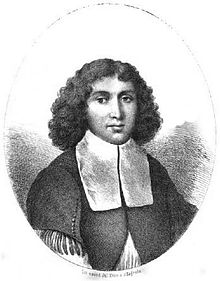Jerolim Kavanjin
Jerolim Kavanjin | |
|---|---|
 Jerolim Kavanjin | |
| Born | February 4, 1641 |
| Died | November 29, 1714 (aged 73) |
| Nationality | Venetian |
| Occupation | poet |
Jerolim Kavanjin (Italian: Girolamo Cavagnini) (February 4, 1641 – November 29, 1714), was a Croatian language poet from Split then in Republic of Venice, today in Croatia.
He was born into a wealthy and noble family of Split, as a descendant of Croaticised Italian family of Cavagnini. Kavanjin rose to prominence at the same time as Ignjat Đurđević: at the beginning of the 18th century. He was married to the sister of John Peter Marchi.[1] In 1703 Kavanjin became a member of the Illyrian Academy Marchi founded in 1703.[2]
In his summer mansion on Sutivan, on the island of Brač, where he retired after military and legislative career, Kavanjin wrote the most voluminas poetical work in the whole Croatian literature (approx. 32 500 verses): Poviest vanđelska bogatoga a nesretna Epuluna i ubogoga a čestita Lazara, usually referred to by the later editors, according to the subtitle in the original, as Bogatstvo i uboštvo. This religious-philosophical epic is poetically inconsistent but stylistically marked (it is written, beside Split Čakavian, in Ijekavian–Ikavian Štokavian).
Expressing the spirit of philosophical movements of the 17th and 18th centuries, this "encyclopædia in verses" (Josip Aranza) directs its Baroque spirituality towards the cogitation on life and human essentiality in the dual nature of the human and the divine.
Beside the classical humanistic, Latinate and Italian literatures (Dante), the Bible and other religious writings, and beside the historical authors (Constantine Porphyrogenitus, priest of Duklja, Mavro Orbini), writings of the Old Dubrovnik have constituted the basic Kavanjin's reading list, above others Junije Palmotić and Ivan Gundulić.
Kavanjin identified with Slavs and Dalmatia, and John Fine interprets his pan-Slavism and Dalmatianism close to have been an ethnic notion.[3]
Kavanjin died in Split, aged 73.
References
- ^ Božić-Bužančić 1999, p. 181.
- ^ Božić-Bužančić 1999, p. 183.
- ^ When Ethnicity Did Not Matter in the Balkans: A Study of Identity in Pre-Nationalist Croatia, Dalmatia, and Slavonia in the Medieval and Early-Modern Periods. University of Michigan Press, 2006. P. 287. Besides this pan-Slavism, which produced in him the identity that came closest to being ethnic, Kavanjin exhibited the noted "Dalmatianism". This local "Dalmatian" identity was the only competitor "Slavic" had. And, after all, as he said, Dalmatia was his homeland. And two such identities could easily co-exist and both could have "ethnic" ingredients.
Sources
- Fališevac, Dunja; Nemec, Krešimir; Novaković, Darko (2000), Leksikon hrvatskih pisaca (in Croatian), Zagreb: Školska knjiga d.d, ISBN 953-0-61107-2
- Božić-Bužančić, Danica (October 1999). "Ivan Petar Marchi-Markić: njegovo djelovanje i njegova oporuka" (PDF). Radovi Zavoda za povijesne znanosti HAZU u Zadru (in Croatian) (41). Zavod povijesti znanosti HAZU: 181–202. Retrieved April 19, 2017.
{{cite journal}}: Invalid|ref=harv(help)
